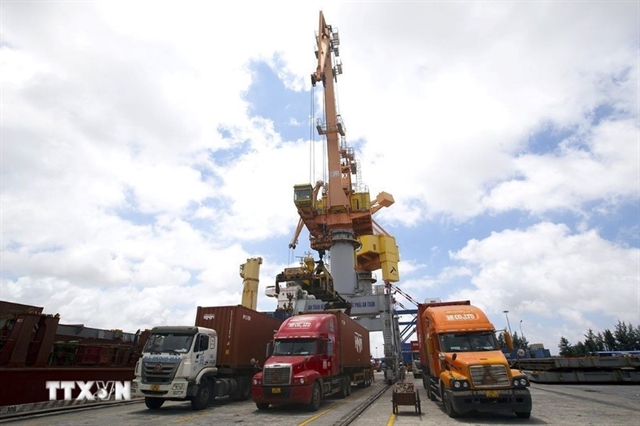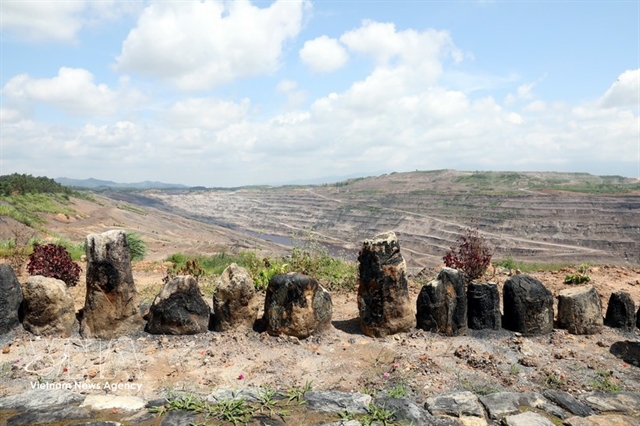 Economy
Economy

 |
| Minister of Finance Hồ Đức Phớc |
The total State budget collection in 2022 reached its target and even rose by nearly 30 per cent against the estimate. The financial sector completed its tasks in the context of having disadvantages at home and abroad.
However, this year, there are still many challenges in implementing targets for the State budget. Minister of Finance Hồ Đức Phớc spoke to Vietnam News Agency about these issues.
How did the sector complete its finance and State budget tasks in 2022?
Many difficulties due to the impact of the COVID-19 pandemic in 2020-2021 created disadvantages for the socio-economic recovery and development of Việt Nam in 2022.
In that context, the financial sector had to implement drastic manners to achieve its assigned tasks and hit its target for 2022.
The Ministry of Finance (MoF) completed the institutionalisation of the guidelines and policies from the Party and the State and of the international integration process.
In addition, the ministry efficiently managed the State budget revenue and expenditure.
It also proposed an economic recovery package worth VNĐ347 trillion to focus on investing in infrastructure, social security and digital transformation.
At the same time, MoF suggested other ministries, sectors and localities cut recurrent expenditures by 10 per cent compared to the budget allocation norms. It proposed policies on exemption and reduction of taxes, fees, charges and land rent, and extension of payment deadline for those items.
Last year, total State budget collection was estimated at over VNĐ1.8 quadrillion (US$76.6 billion), up 27.8 per cent against the estimate and 15 per cent year on year.
It ensured resources to support the programme of socio-economic recovery and development; and offset the decrease in the State budget revenues due to tax, fee and charge exemption and reduction policies.
Meanwhile, public, Government and sovereign debts in 2022 reached 38 per cent, 34.7 per cent and 36.8 per cent of the country's GDP, respectively. The Government’s direct debt obligations were 16.3 per cent of the total State budget collection, within the scope permitted by the National Assembly.
Mistakes made by several enterprises caused complications in the corporate bond market, so the MoF submitted solutions to the Government to amend and supplement several regulations on offering and trading private placement corporate bonds in the domestic market and offering corporate bonds to the international market.
At the same time, the ministry also suggested measures to stabilise the corporate bond market, remove difficulties for issuers, and ensure the interests of bond investors. Those aimed at stable and safe market development goals in the medium and long term.
In the context of the difficult socio-economic situation last year, the financial sector operated proactively and flexibly the fiscal policy to complete the finance - State budget tasks.
Tax policies that effectively supported businesses in 2022 will expire this year. What plan does MoF have to continue supporting businesses this year?
Since early 2020, the COVID-19 pandemic has negatively impacted enterprises' production, business activities, and people's lives.
Therefore, the ministry has proposed solutions for extending payment of taxes such as value-added tax, corporate income tax, personal income tax, excise tax and land rent, as well as exempting or reducing the taxes, fees, charges and land rent. The total value of those supports was about VNĐ129 trillion in 2020 and VNĐ145 trillion in 2021.
This value stood at VNĐ233.5 trillion in 2022, including the reduction of the environmental protection tax on gasoline and oil.
With the rapid increase in gasoline prices on the world market putting pressure on inflation and affecting the enterprises' production and business and people's lives, the ministry has proposed to reduce the environmental protection tax to the floor level for gasoline, oil and grease until the end of 2023.
In addition, the value-added tax reduction of 10 per cent was applied to many goods and services.
Those solutions reduce the cost of goods and services, promoting production and business and creating more jobs for workers. At the same time, they contributed to controlling inflation, stabilising the macro-economy and ensuring social security.
Those solutions were highly appreciated by the business community and the people and contributed to the economic recovery and development in the past.
The ministry will continue to closely monitor the actual situation to study and propose appropriate solutions for 2023, such as extending the deadline for paying for taxes and land rents; and reducing preferential import tax for input materials for production, environmental protection tax on gasoline and oil, and land rent.
In the long term, with the guidelines and orientations set in the Resolutions of the Party and the National Assembly, the ministry will continue to complete the synchronous tax policies following international practices; and ensure resources for implementing the 10-year socio-economic development strategy from 2021 to 2030.
The ministry will continue to reform administrative procedures and accelerate the modernisation of all areas of the financial sector, especially taxation and customs.
Those will create a favourable and fair investment and business environment and promote competition.
At the same time, the ministry will continue to implement several solutions to support businesses and people to cope with difficulties and challenges in the coming time.
What will the financial sector do to fulfil the fiscal and budget targets in 2023?
In 2022, the State budget revenue was completed and exceeded the estimate of the National Assembly. This was not only the result of the efforts from the financial sector but also correct decisions on economic recovery and inflation control of the Party and State.
However, since the third quarter of 2022, the economy has shown some difficulties at home and abroad. Those are great pressures for completing the State budget collection in 2023.
Therefore, the Government is studying several solutions to remove difficulties for businesses, curb inflation, stabilise the macro-economy, and create a good environment for corporate development.
However, the solutions may reduce the State budget revenue in 2023 compared to the estimate, creating pressure on completing the tax collection task.
To achieve the finance and budget targets in 2023, the ministry will continue to implement the guidelines and orientations of the Party and resolutions on fiscal policy from the National Assembly and the Government.
In addition, it will review, amend and supplement tax laws following the Tax System Reform Strategy to 2030 and closely manage the State budget revenue and expenditures.
The ministry will continue to improve the legal system on price management; have flexible prices based on supply and demand forecasts of commodities, especially for energy, building materials, iron and steel groups.
It will also take necessary measures to stabilise and develop a transparent and sustainable capital market, opening up medium and long-term capital sources for investment and development. It will focus on perfecting legal and institutional frameworks, strengthening supervision, and improving efficiency in law enforcement in this market. VNS
State budget collection up 15 per cent in 2022
Total State budget collection was estimated at over VNĐ1.8 quadrillion (US$76.6 billion) in 2022, equivalent to 127.8 per cent of the estimate, up 15 per cent year on year, reported the Ministry of Finance (MoF) on January 3.
The domestic revenues to the State budget were 21.8 per cent higher than the estimate, marking an annual increase of 9.9 per cent. Meanwhile, those from crude oil and exports-imports rose by 74.3 per cent and 32.7 per cent year-on-year, respectively.
The higher-than-estimate budget collection was thanks to an 8.02 per cent GDP growth and hikes of 19.8 per cent in total retail, 7.8 per cent in industrial production index, 10.6 per cent in exports, 8.4 per cent in imports, and a trade surplus worth $11.2 billion. Rising prices of petrol and input materials also pushed up revenues from crude oil and exports-imports.
Several revenues were higher than the estimates, such as individual income taxes up 38.5 per cent, housing and land use fees and taxes up 54.5 per cent. The recovery of capital and collection of dividends and post-tax profits of the State Bank went up 17 per cent thanks to recovering production and trade.
Revenues from the lottery, State-owned, foreign-invested and non-State enterprises also exceeded estimates by between 14.3 per cent and 21.5 per cent.
The total expenditure was estimated at VNĐ1.5 quadrillion, or 87.5 per cent of the estimate, up 8.1 per cent year-on-year. VNS




